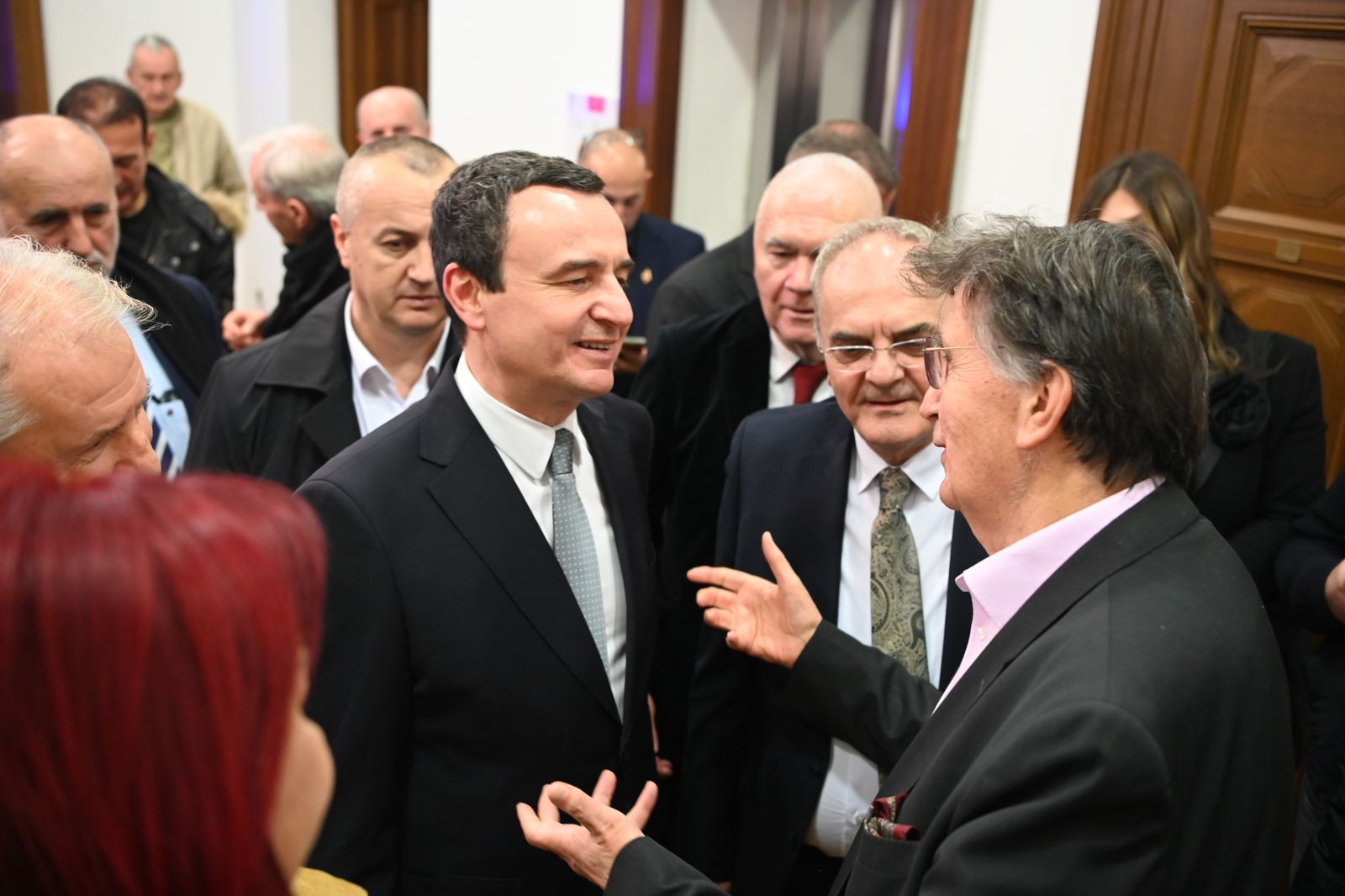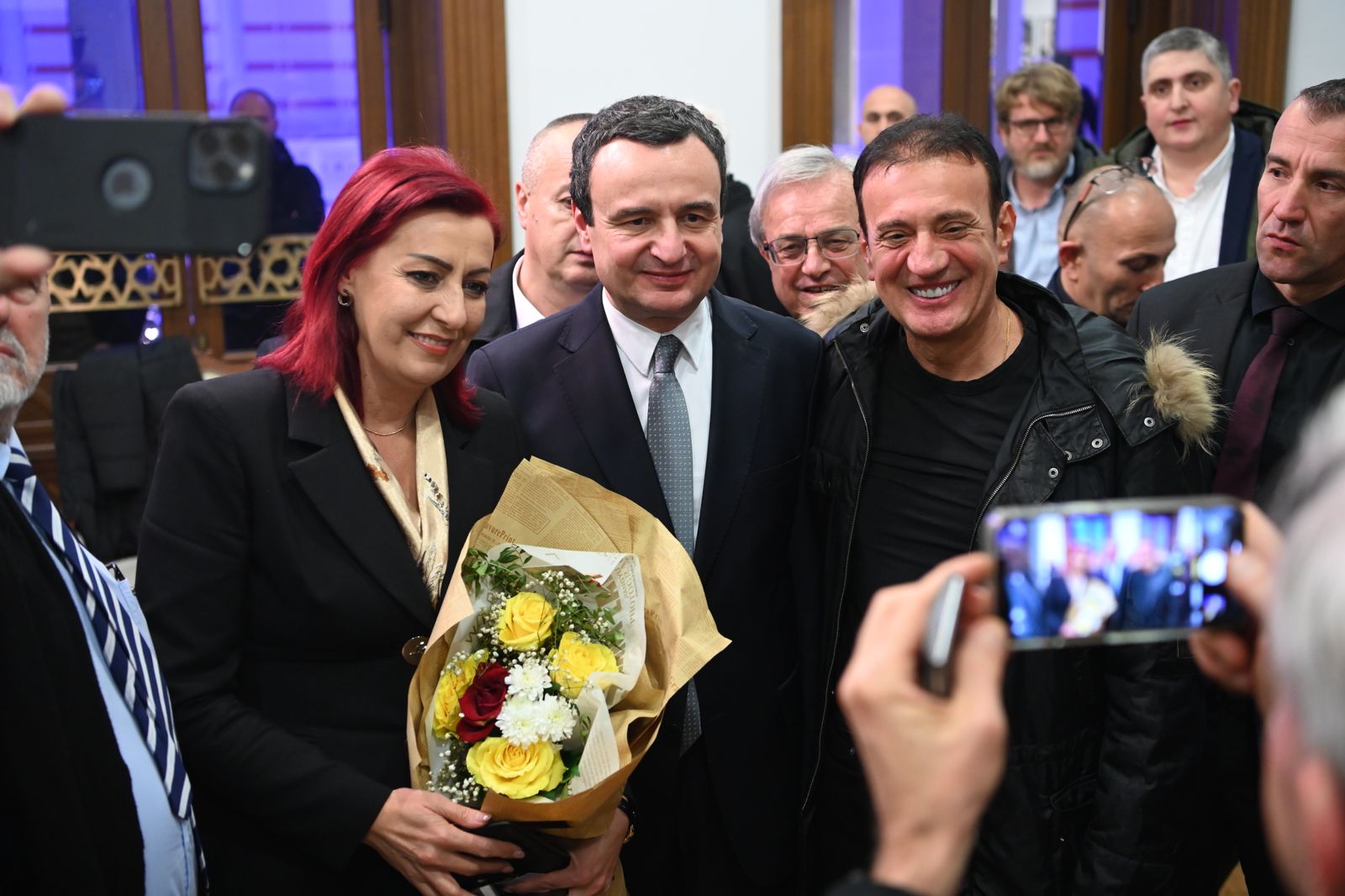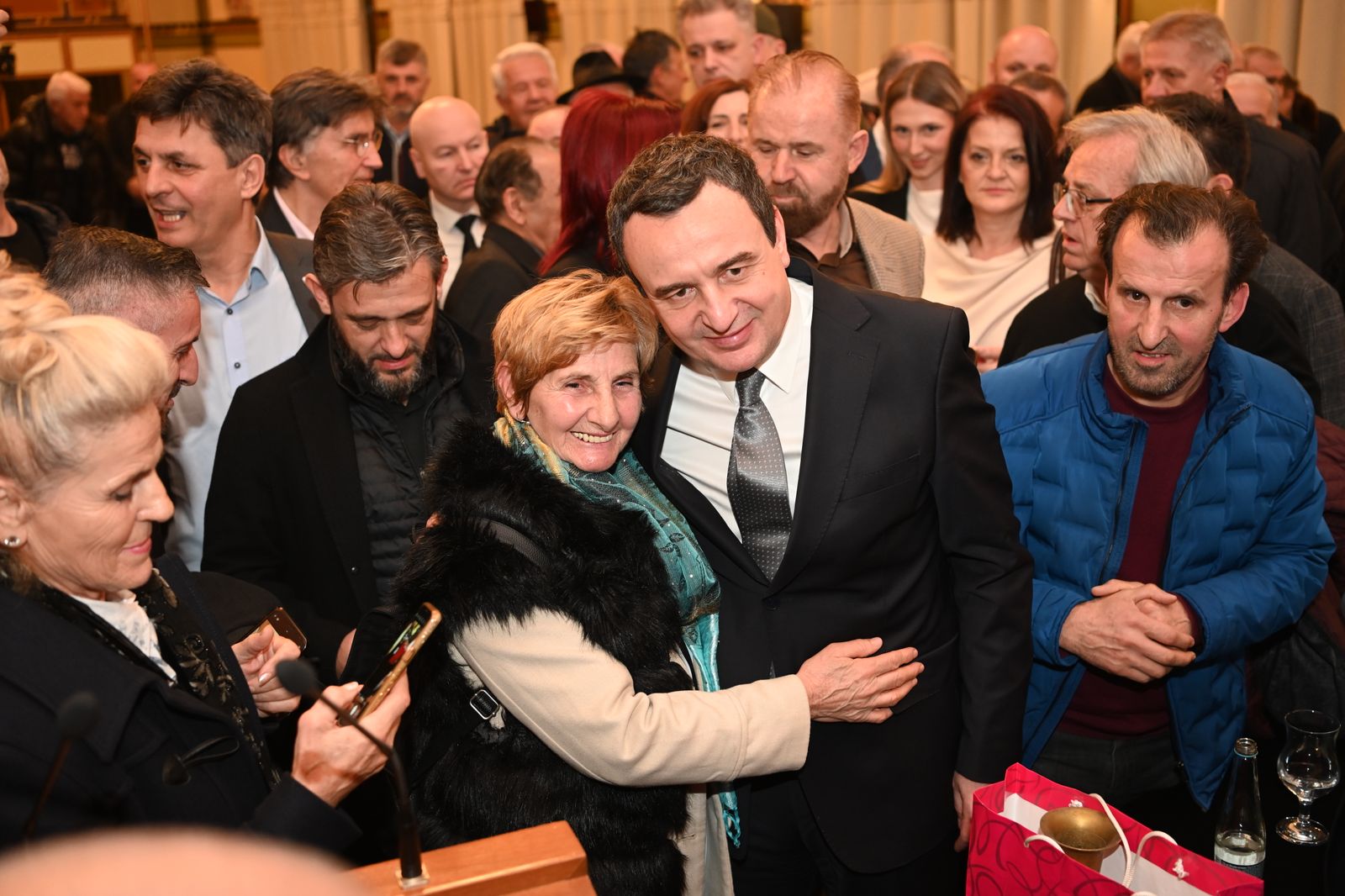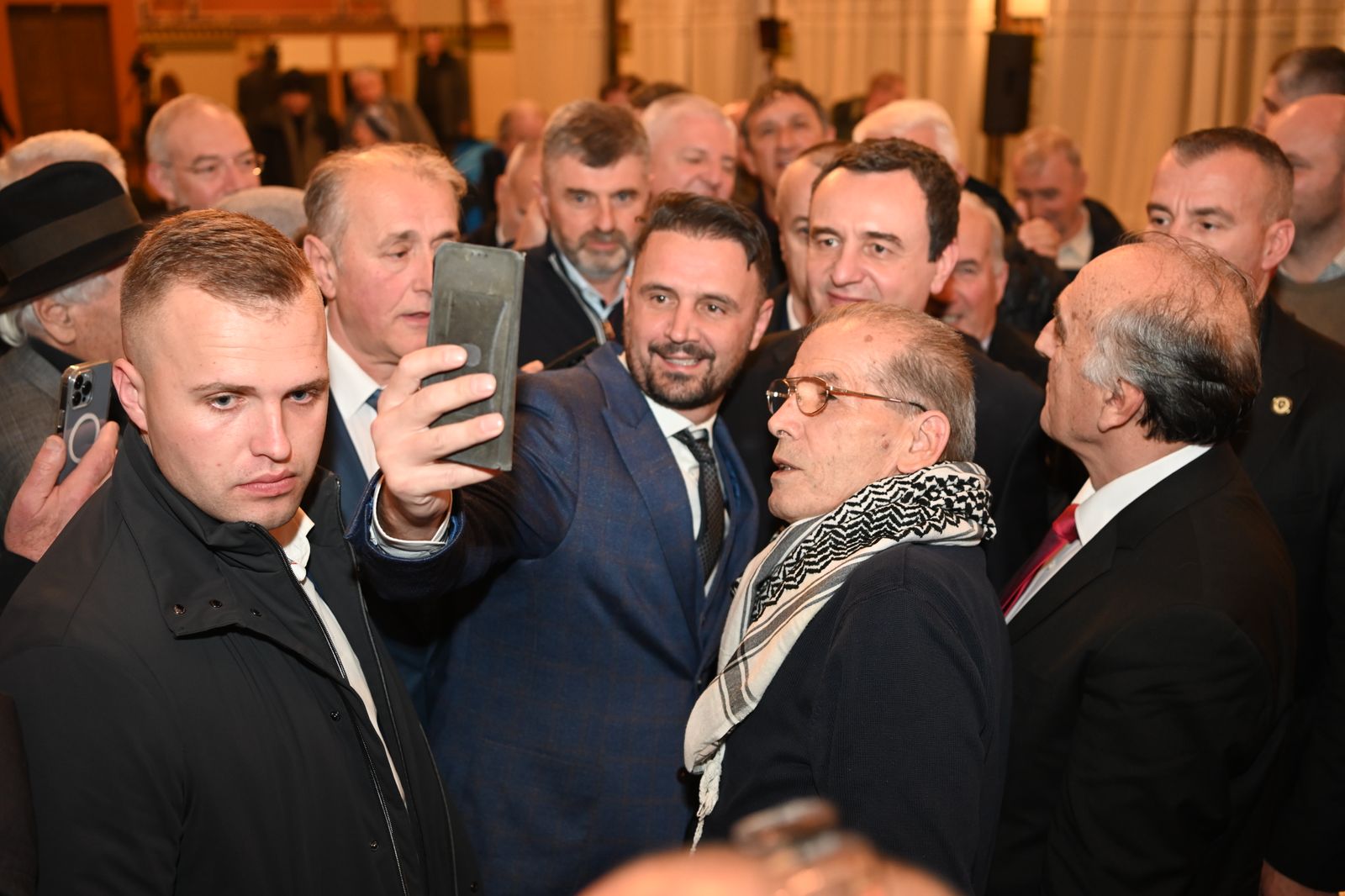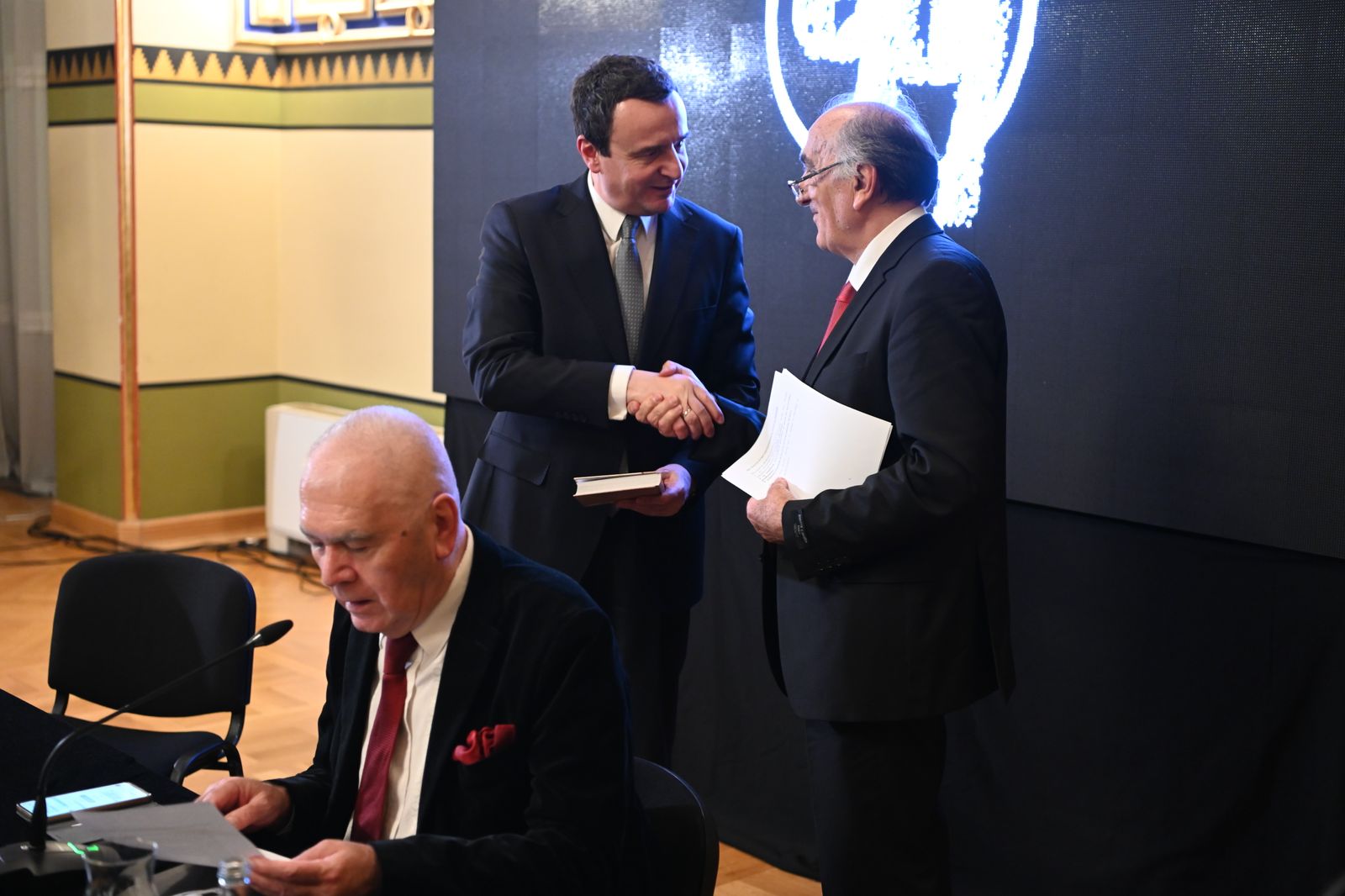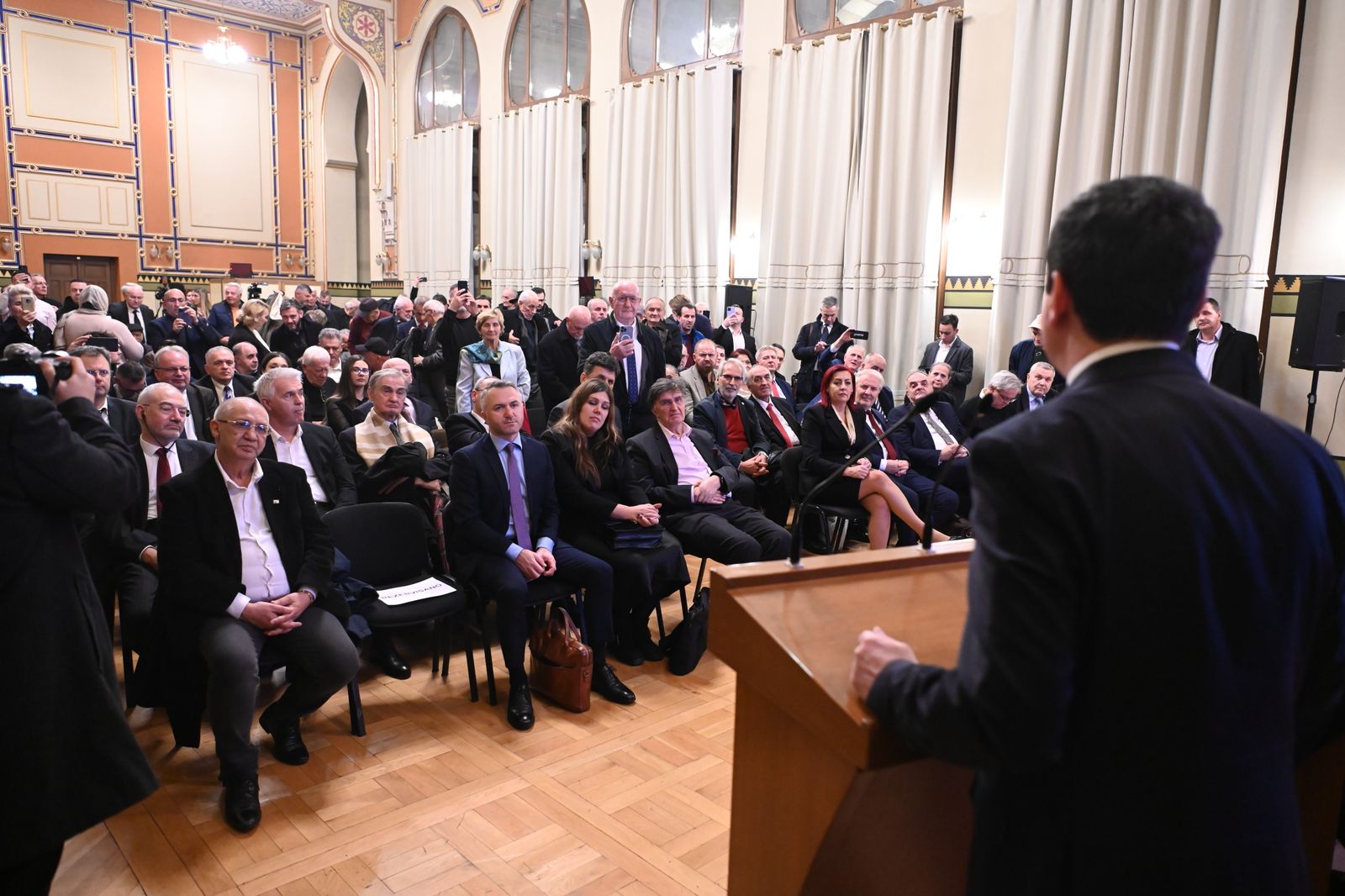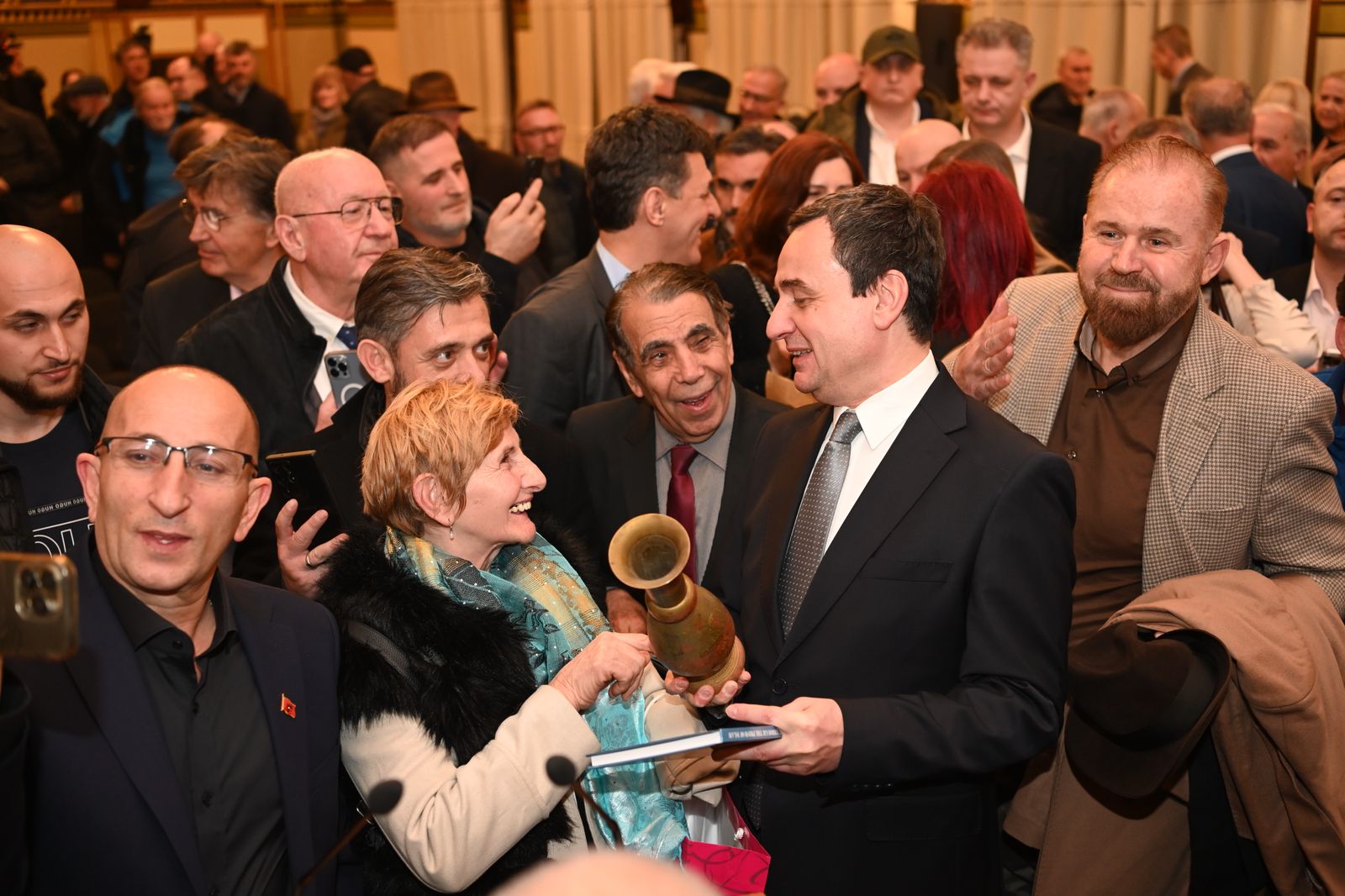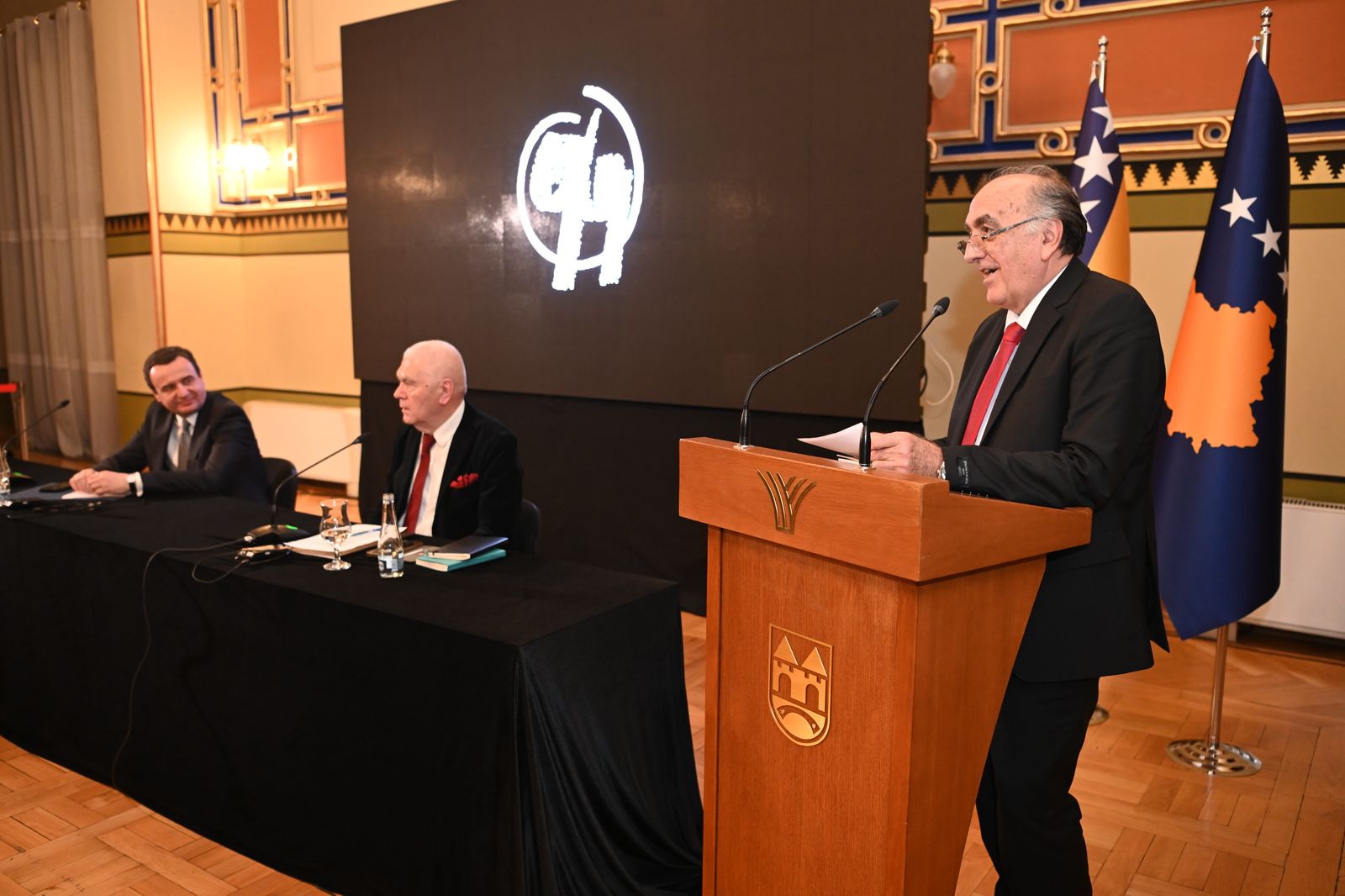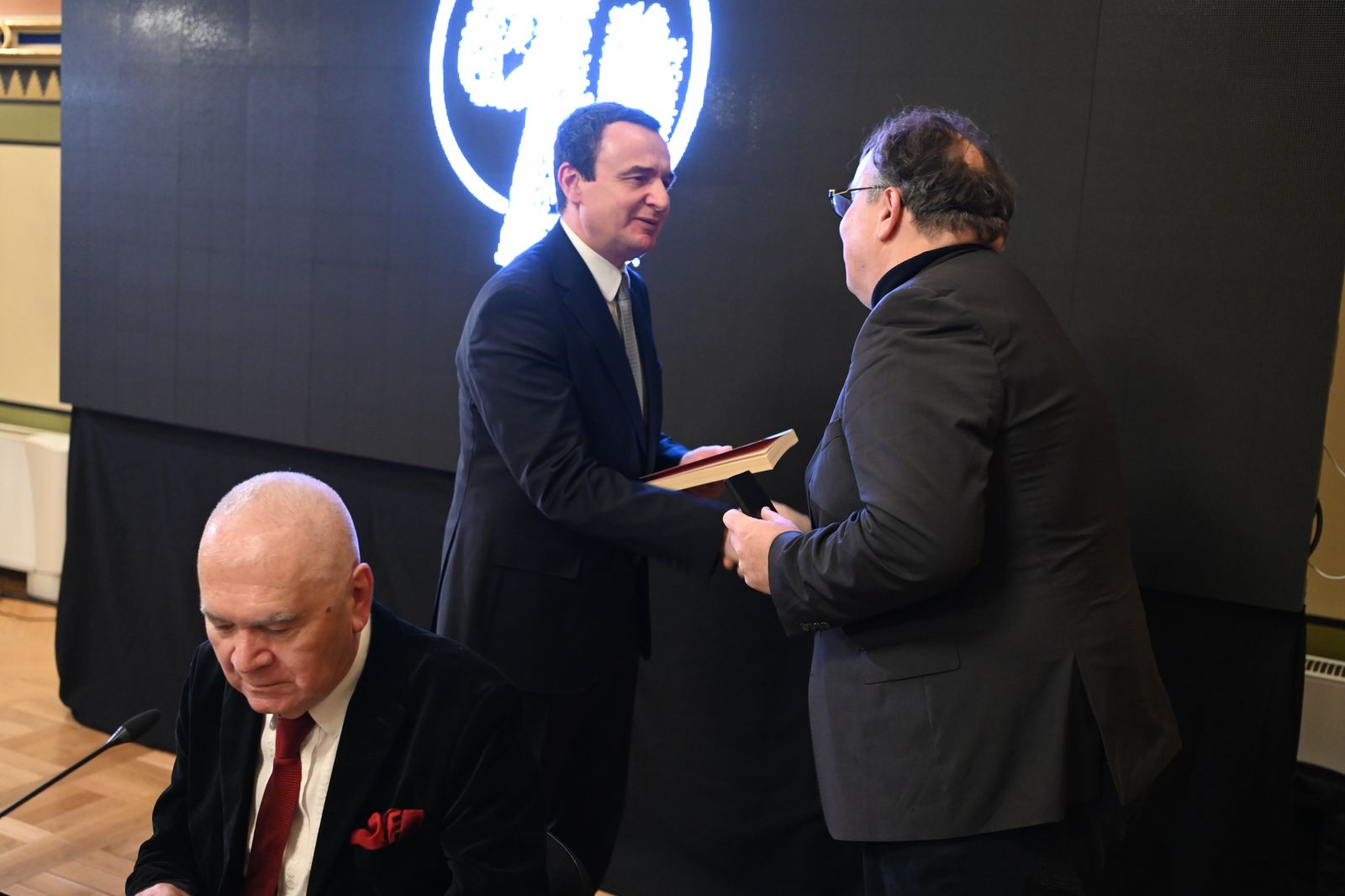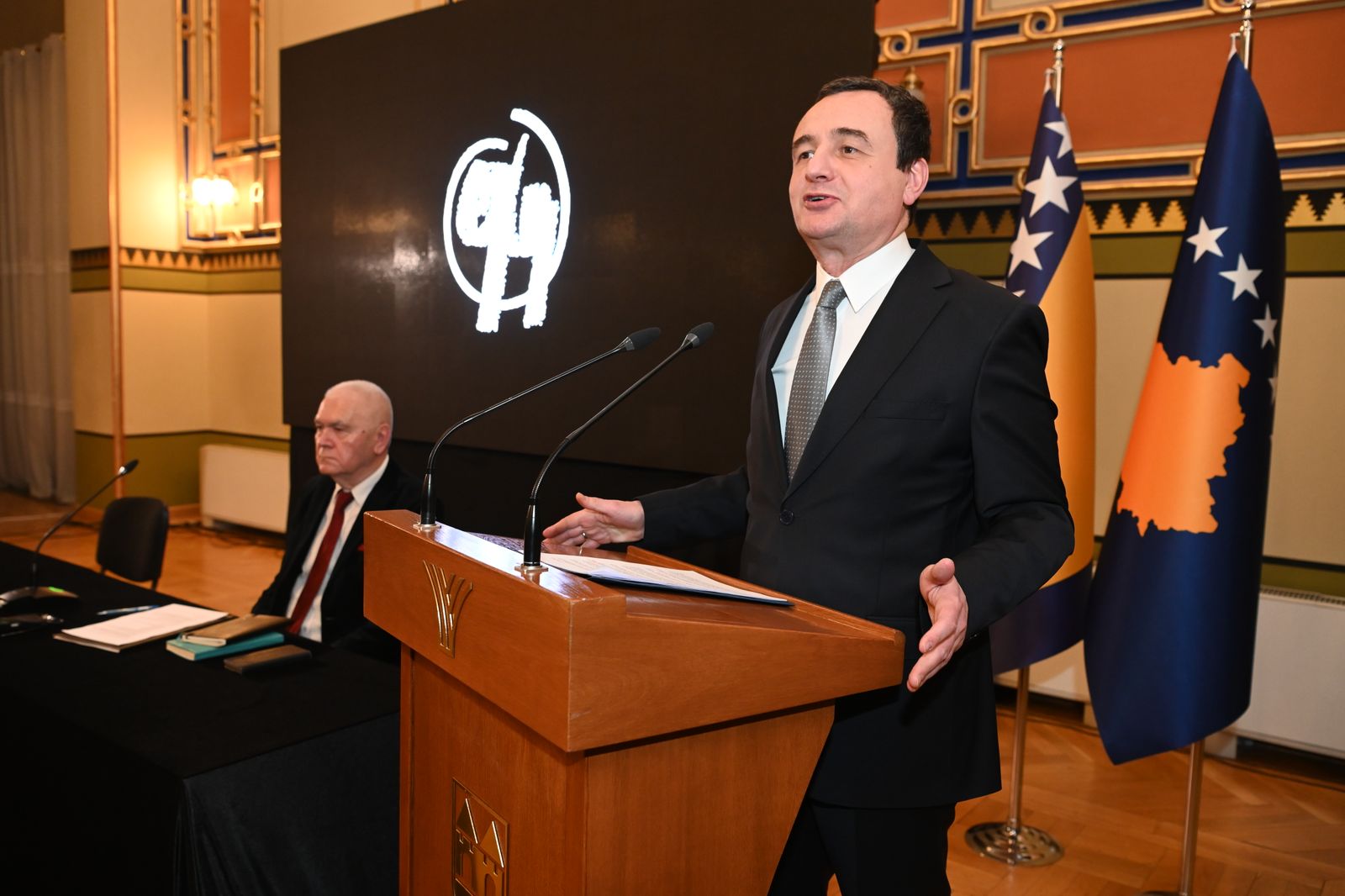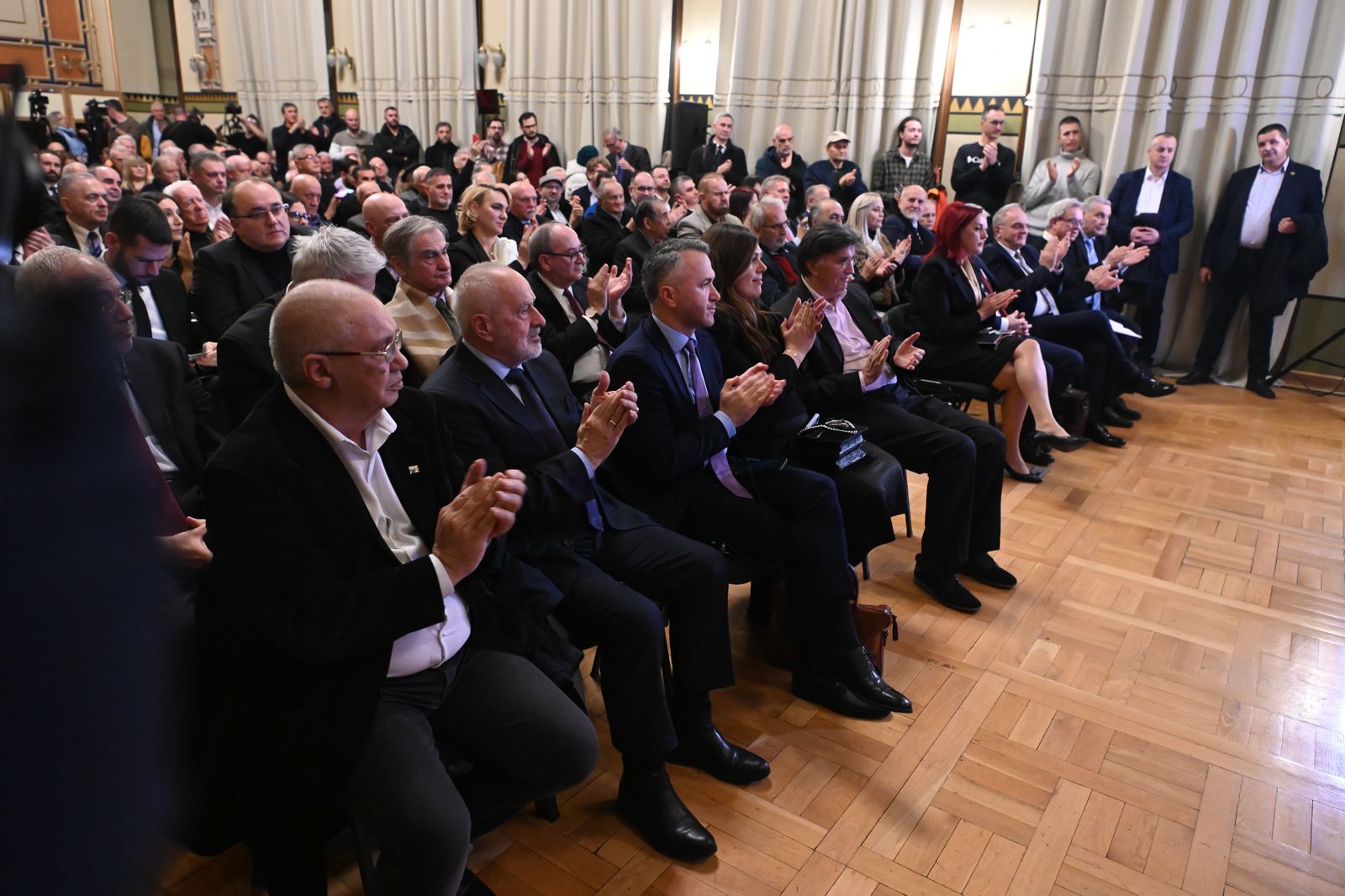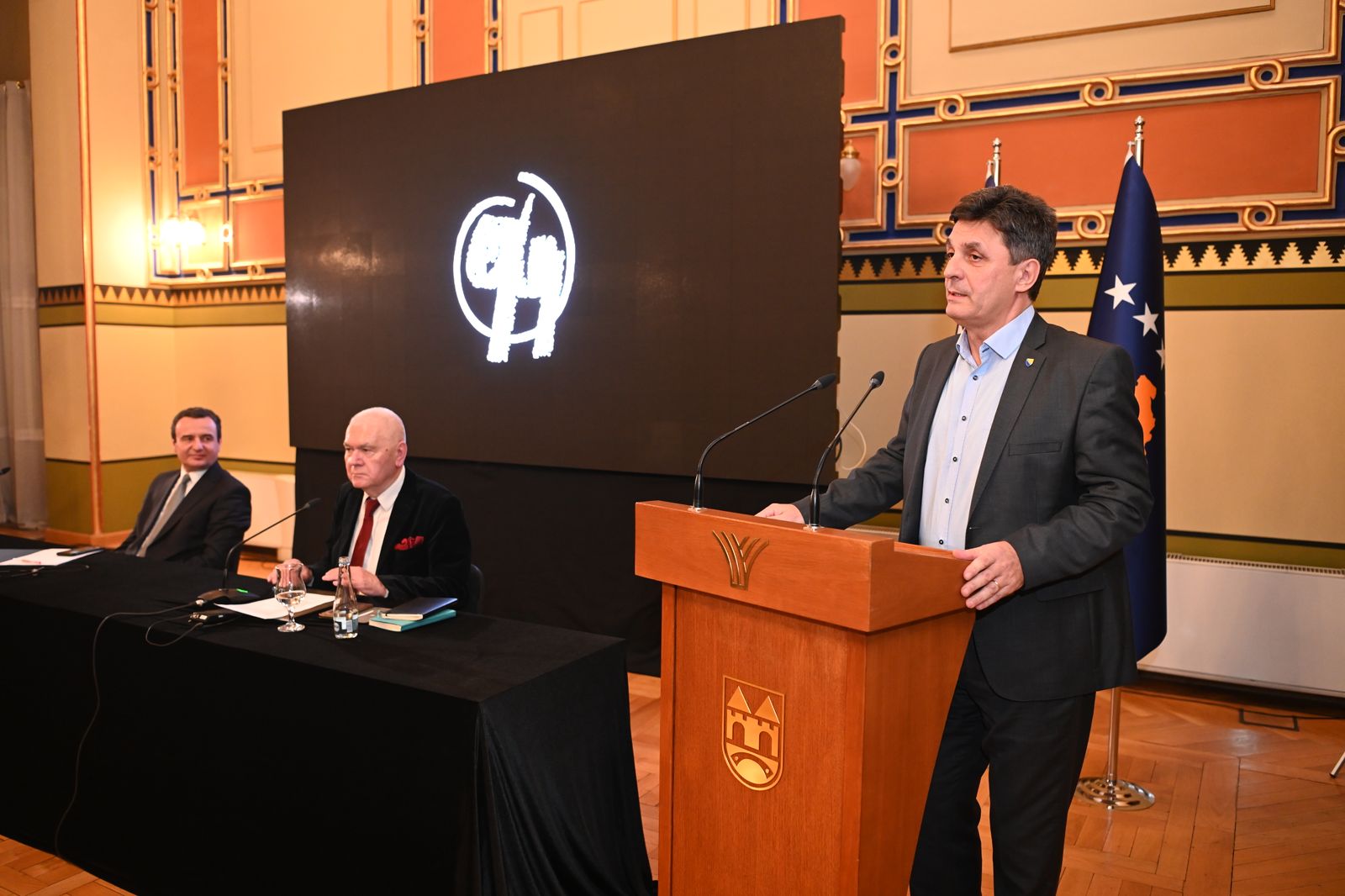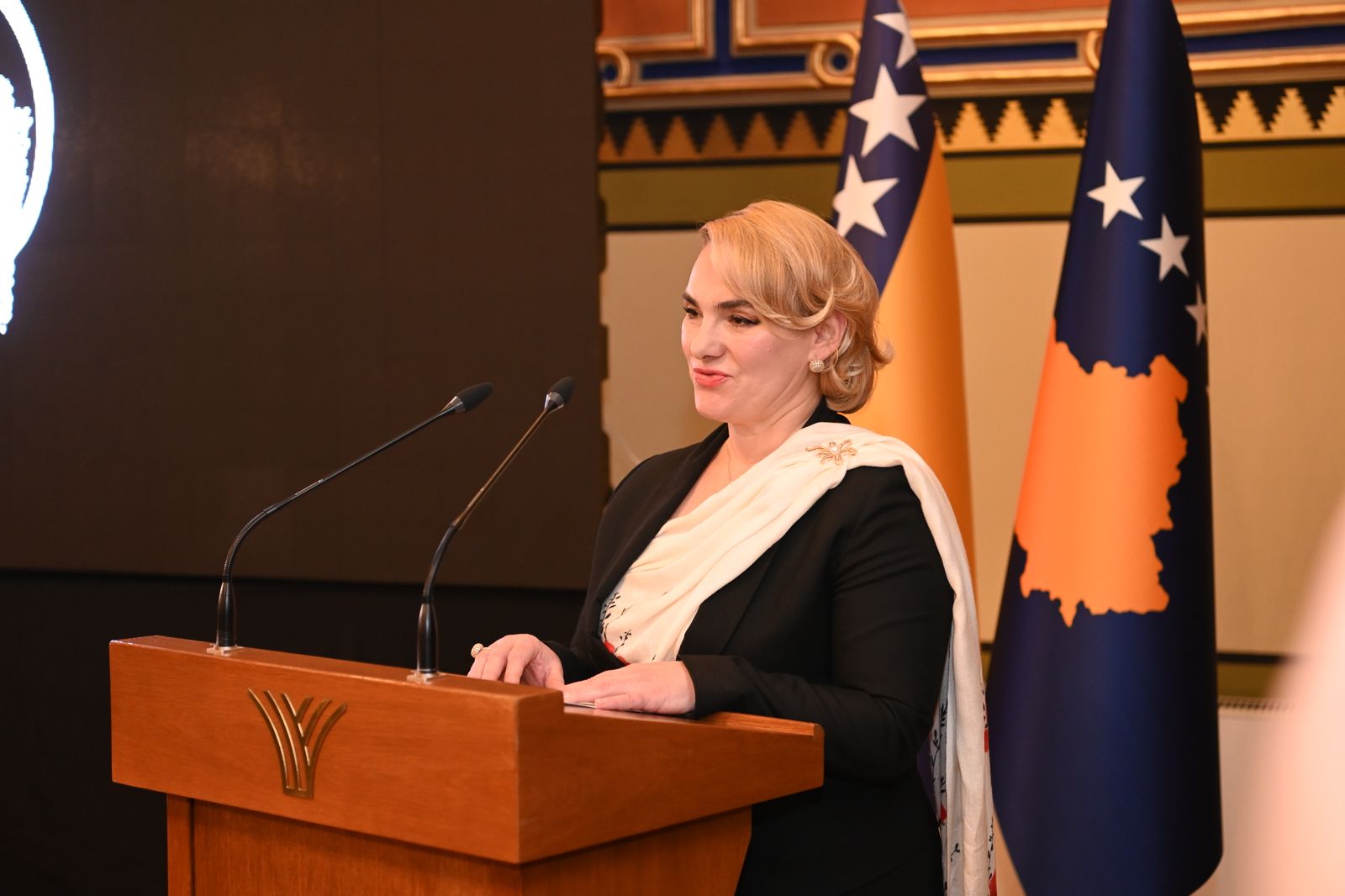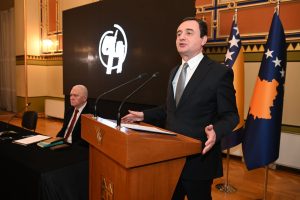Sarajevo, 7 December 2024
The Prime Minister of the Republic of Kosovo, Albin Kurti, during his stay in Sarajevo, participated as a keynote speaker in the discussion organized by the Association of Independent Intellectuals Krugg 99, under the theme “The Development of Regional Relations with a Special Focus on Relations Between Bosnia and Herzegovina and the Republic of Kosovo.”
In his opening address, he stated that he came to Sarajevo as a friend and partner, not just as a representative of his country, emphasizing that “our relationship is rooted in the people and the values we share – democracy, the rule of law, human rights, and an unwavering commitment to the dignity of every individual.”
“Kosovo and Bosnia are connected not only through shared history and familial ties but also through a painful and tragic past. Kosovo owes much to Bosnia in many ways. Largely, it was because of the horrors witnessed by the world here in Bosnia and Herzegovina that NATO intervened in Kosovo before intervening in Bosnia, to stop Serbia’s genocide. NATO intervened in Bosnia and Herzegovina after Srebrenica, in the fourth year of the war, while in Kosovo it was in the second year of the war, because of Srebrenica,” the Prime Minister stated.
He stressed that democracy and the rule of law are fundamental, which means that no one should be above the law, but also that no one should be outside the law.
“For ordinary citizens, the presence of the rule of law means freedom, whereas for criminals, it means the opposite. The presence of politicians above the law and criminals outside the law is why we have significant organized crime in our Balkan region. These very structures fuel tensions in our region and threaten new conflicts and wars.”
Regarding developments in the country and governance, he stated that Kosovo is not a large country but serves as a remarkable example of how democratic progress and economic growth can go hand in hand.
“We live in a time when some powers and superpowers want to prove that development and economic growth do not require democracy, human rights, or the rule of law. However, we have shown and proven that it is possible to achieve economic growth on one hand and democratic progress on the other. We have also demonstrated that, in the meantime, we have successfully managed some of the greatest security challenges. We want to build a friendship with Bosnia and Herzegovina on this foundation and move together towards Euro-Atlantic integration as quickly as possible. Bosnia and Herzegovina on one side and the Republic of Kosovo on the other are not problems, but Bosnia and Herzegovina and the Republic of Kosovo have problems, and one problem they share is your eastern neighbor and our northern neighbor, who is the same neighbor. We cannot change geography or history, but together, we will change our future for the better,” the Prime Minister expressed.
He noted that Bosniaks are a stabilizing factor in all countries of the region: in Serbia, where most of them are in Sandzak, in Montenegro, where they are the third-largest group, and in Kosovo, where they are the largest minority after Serbs.
“Bosnians across the Balkans, as well as in the diaspora, collaborate excellently with Albanians, fostering unconditional hospitality, social coexistence, and good neighborly relations. So, let us work together because we can do better and achieve more,” he stated, thanking the attendees for their hospitality and discussion and inviting them to visit Kosovo next year, taking advantage of the possibility of travel with an ID card starting from 1 January 2025.
The full speech of Prime Minister translated into Albanian:
Unofficial Translation
Thank you, dear colleagues and cherished friends, for such a heartfelt and warm welcome. It is truly an honor and a pleasure to be in Sarajevo. This is a city that carries the weight of history and the promise of the future in every stone and street.
For me personally, Sarajevo is more than just a city – it is a symbol of resilience, diversity, a city of intellectuals and artists, of culture and heritage. In Sarajevo, every corner whispers a story of creativity, struggle and triumph.
As you know, on the 3 and 4 December, we, the leaders of the Western Balkans, were supposed to meet in Neum for the EU growth plan. Following Skopje in January, Tirana in February, and Kotor in May, Neum was meant to be the fourth meeting of the growth plan this year. However, the summit in Neum was canceled. But I could not cancel my visit to Sarajevo.
Before I continue, allow me a friendly reminder. If I make any mistakes in my expression, I apologize in advance for errors in the Bosnian language. In primary school, I learned Serbo-Croatian from a Montenegrin teacher.
I would like to begin this speech with a quote from the politician, political prisoner, philosopher, and great Bosnian writer, who was also the first president of the independent Republic of Bosnia and Herzegovina, Alija Izetbegovic:
On 9 July 1992, at the OSCE meeting in Helsinki, only three months after the war had begun, President Izetbegovic said: “Bosnia was not created by the dissolution of Yugoslavia. It was a European independent kingdom six centuries ago. Located at the crossroads between two churches and their different spiritual orientations, it was already recognized in neighboring countries, including the Holy See. Then came centuries of turbulent history, the result of which is Bosnia and Herzegovina as a multiethnic, multi-religious and multicultural state.”
In other words, Bosnia has existed before, during, and after Yugoslavia and will continue to exist as a democratic, multiethnic, multireligious, and multicultural state under international law.
I come to Sarajevo today as a friend and partner, not just as a representative of my country. Our relationship is rooted in the people and the values we share – democracy, the rule of law, human rights, and an unwavering commitment to the dignity of every individual.
Sarajevo is less than six hours away from Pristina, but to get here, my delegation and I had to overcome the barrier of visa restrictions. I bring you the greetings of the people of Kosovo, who see in Bosnia a friend long denied the opportunity for friendship. But we share a history and a common European future. Therefore, we have decided to unilaterally implement the agreement on freedom of movement with ID cards, which we achieved together in the Berlin Process.
Kosovo and Bosnia are connected not only through shared history and familial ties but also through a painful and tragic past. Kosovo owes much to Bosnia in many ways. Largely, it was because of the horrors witnessed by the world here in Bosnia and Herzegovina that NATO intervened in Kosovo before intervening in Bosnia, to stop Serbia’s genocide.
NATO intervened in Bosnia and Herzegovina after Srebrenica, in the fourth year of the war, while in Kosovo it was in the second year of the war, because of Srebrenica. I know that the genocide in Bosnia and Herzegovina is denied. Yesterday marked five years since the statement made by the President of Serbia, Aleksandar Vucic, which I want to quote: “I and all the members of the Serbian List repeat that Racak is fabricated.” Thus, the President of Serbia called it appalling that a Serbian politician in Kosovo was sentenced to two years in prison for stating that the massacre in Racak was fabricated. He said that he himself repeats that it was a fabricated crime and asked whether everyone would judge them for this. “It is appalling,” he told journalists in Sabac five years ago and continued: “All the members of the Serbian List will repeat the same thing, and I am repeating it now: the crime in Racak is fabricated, where everything was falsified by that global con artist, thief, and a nobody, Walker,” said Vucic.
But dear friends, I believe we all agree that instead of being enraged, the regime in Belgrade should feel ashamed.
And I cannot help but recall, in this context, the words of Richard Holbrooke in the preface to Derek Chollet’s book, where he states the following, and I quote: “In hindsight, there are many things we could have done better before, during, and after Dayton. For example, I deeply regret accepting that the Bosnian Serbs retain the name Republika Srpska for their entity. The President of Bosnia and Herzegovina, Alija Izetbegovic, was right when he told me it was a ‘Nazi name.’ We should have tried harder to change it, for both practical and symbolic reasons.”
Thus, Serbia denies the genocide in Kosovo, denies the genocide in Bosnia and Herzegovina, denies the massacre in Srebrenica, and even the massacre in Racak; they deny their criminal past, and in doing so, they demonstrate and prove that they would repeat what they have done if given the chance again, therefore, it is crucial that we strengthen our countries and, in this way, help prevent them from repeating their crimes.
What is needed now is leadership that reflects the diversity of Bosnia and Herzegovina and its unique history and culture. Such leaders already exist here – leaders who transcend divisions and unite people based on shared needs and rights: dignified work and wages, a sense of justice and equality, good schools and roads, clean air, and health and social care.
The future of Bosnia does not depend on decisions weighed against a precise balance among the three entities, but rather on what is good for all Bosnians as citizens. It depends on leaders who build, not destroy.
Today, the European path is more important than ever. That’s why we must commit ourselves to economic growth, democratic progress and social development.
Those who wish to follow the European path should join us; those who do not are free to leave, because Europe is our continent. We want to benefit from it, but we also wish to contribute to it.
Democracy and the rule of law are fundamental, which means that no one should be above the law, but also that no one should be outside the law. Far too often, those considered above the law are connected to those operating outside it.
For ordinary citizens, the presence of the rule of law means freedom, whereas for criminals, it means the opposite. The presence of politicians above the law and criminals outside the law is why we have significant organized crime in our Balkan region. These very structures fuel tensions in our region and threaten new conflicts and wars.
Therefore, for us, the rule of law is the foundation of every step we take. The rule of law and human rights, as indispensable parts of democracy, are the principles upon which we base our governance in the Republic of Kosovo and guide the country toward a better future, the democratic state-building of Kosovo is grounded in the books and lessons of the democratic West, not according to its treatment of us.
Despite facing the greatest threats and attacks from Serbia, over these past four years, we have experienced the most significant economic growth and democratic progress since the declaration of independence. We have achieved notable results in combating corruption and organized crime, climbing 20 places on the Transparency International Corruption Perceptions Index. Meanwhile, the average economic growth during the three years of our governance has been 6.36% of gross domestic product; exports have doubled, and the export-import ratio has improved from 1:9 to 1:6; unemployment has dropped from 26% to nearly 11%. We have the lowest public debt in Europe, at just 17%. We have increased the state budget by 50% since 2021 without altering fiscal policy. You know, when people believe there is no corruption in government and when they have hope and optimism, they are willing to spend more and save less. And this is good – it is better for their lives and for the state’s economy. We distributed this gain, this growth, to the people, tripling the minimum wage, providing financial assistance to mothers and children on a monthly basis, and doubling youth employment.
In the four years of our governance, the average economic growth by the end will be above 6%, never falling below 4% in any year. The turnover of businesses has risen from 12 billion euros before our government to 22 billion euros this year.
We provided free education and studies and invested in youth, sports and culture. In 2030, Kosovo will host the Mediterranean Games. We continue to build many new stadiums across the entire territory of Kosovo. We have allocated 250 million euros solely for the organization of these Mediterranean Games.
We have provided more than 300 million euros in financial support to nearly 120,000 farmers. Approximately 10 million euros have been allocated to women in agriculture. We have simplified procedures for applying for subsidies. We have granted subsidies for fuel, fertilizers, and yield – productivity in harvesting – on top of the subsidies for the acreage of farmers’ fields in Kosovo.
We have passed the law on public sector salaries, reducing wage disparities, which have decreased from 1:20 to 1:4.78, and by July next year, it will be 1:4. The less inequality there is, the stronger the social cohesion and the higher the aggregate demand in the economy.
Thus, when inequality decreases in a society, its cohesion grows, which is also beneficial for the economy because aggregate demand increases.
Kosovo’s Gross Domestic Product this year is seven times higher compared to the year 2000, the first year after liberation; three times higher compared to 2008 when we declared independence; and 50% higher than five years ago, in 2019, which was the first pandemic year. Thus, both liberation and independence have paid off economically as well.
Tax revenues in Kosovo this year are 60% higher than in 2019, 75% higher than in 2020 during the pandemic when we lacked vaccines, and 40% higher than in 2021, the first year of our mandate.
We have completed the restoration of cultural heritage sites, including 100 interventions on various objects, achieving twice as much for cultural heritage compared to the previous 20 years.
We organized a successful solar energy auction, and we are now preparing for a wind energy auction. We have invested in the transition toward green energy and environmental protection. By the end of this decade, Kosovo will require seven billion euros in investments for approximately 50 projects related to energy, environmental protection, and transportation, and this investment will come from both our budget and the private sector.
We renovated state clinics and doubled the budget for healthcare and defense. We are investing in defense – but if you ask me, I believe we should invest far more money in people and less in the military. Then the question arises: why are we investing in the military? Because we still have leaders in the Balkans who strive for division and territorial expansion. They invest in their military for these reasons, and we are compelled to spend on defense. The issue is, therefore, the hegemonic and expansionist mentality of our northern neighbor.
However, I remain optimistic, as today there is no longer mass nationalism serving as fuel for the dictator’s war machine. If someone brought a truckload of Kalashnikovs 30 years ago, many villages would have emptied it within half an hour. But today, they report it to the police. So, if you are caught with a Kalashnikov, you report it to the police, and I believe this is significant progress we have achieved. However, we must remain vigilant because Russia’s aggression against Ukraine represents a brutal violation of the sovereignty of an independent state, an act that reminds us of the darkest moments in European history. This relentless attempt to destroy Ukraine’s identity and territorial integrity has also been reflected in separatist policies in the Balkans. Just as the Russian invasion is a direct threat to peace and security in Europe, so too do secessionist aspirations within it pose a serious challenge to the survival of a democratic society. It is time for everyone in Kosovo, Bosnia and Herzegovina, and beyond to condemn such policies that incite division, violence, and hatred, as silence in the face of aggression and separatism leads only to new conflicts and tragedies.
Today, the security of my country, the Republic of Kosovo, is established through the security of our borders. The project of Greater Serbia, which today is called the Serbian World, has no borders because it does not want them and cannot have them. Therefore, we must protect the longest border we have, precisely the one with Serbia.
Serbia claims that Bosnia and Herzegovina might be a temporary state, perhaps it will dissolve, but believe me, as someone who knows them very well, they say this out of fear that they themselves will dissolve. After the dissolution of the former Yugoslavia, Serbia fears that its turn has come to break apart. Now, whenever they mention Republika Srpska in Belgrade, be certain that they mention Republika Srpska much more often than we think, not to mention Vojvodina. We are also witnessing how, at times, parallels are drawn between our two countries. However, when the International Court of Justice issued its Advisory Opinion on Kosovo in July 2010, in which it declared that Kosovo’s declaration of independence did not violate international law, someone from Republika Srpska immediately reacted, suggesting that they should now use that decision of the International Court of Justice. But the situations are diametrically different in the sense that, as Noel Malcolm wrote in paragraph 112 of that Opinion, the International Court of Justice summarized the argument presented by many states, with which the Court agreed, that when the Security Council adopted Resolution 1244 on Kosovo’s governance, if the Security Council had intended to prevent Kosovo’s declaration of independence, it would have done so clearly and unequivocally within the text of the Resolution itself, as it did in Resolution 787 from 1992 regarding Republika Srpska. The relevant chapter of Resolution 787, paragraph 3, emphasizes that the Security Council strongly reaffirms its call to all parties and other interested parties to strictly respect the territorial integrity of the Republic of Bosnia and Herzegovina and confirms that any unilaterally declared entity, or imposed solutions in violation of this paragraph, will not be accepted. The principle of this Resolution was upheld in the Dayton Agreement, which granted Republika Srpska only the status of an entity within the sovereign state of Bosnia and Herzegovina.
Meanwhile, dear friends, when I say we must be careful, I do not only mean the Russian aggression in Ukraine and the possibility of this conflict spreading to our region, but also the fact that Kosovo has experienced two terrorist attacks within a year and two months. The first was on 24 September of last year, when police officer Sergeant Afrim Bunjaku was killed, and the second on 29 November of this year, meaning last week, with the attack on the Iber-Lepenc Canal, which is of critical and vital importance for water and electricity supply. Therefore, the attack on this canal is an attack on the civilian population, a crime prohibited under the Geneva Convention.
Now, in Kosovo and I believe elsewhere in the Balkans, we no longer have the mass nationalism which, as I said, served as fuel for the war machines of various dictators. But with this terrorist attack on critical infrastructure in Kosovo, where the civilian population was targeted, there is an effort to rekindle nationalism among ordinary citizens. Because until now, they have thrown hand grenades at police stations and various municipal buildings, but now, this is the first attack where they have directly targeted the civilian population.
Before this, on 24 September 2023, they attempted to replace the de facto mutual recognition between Kosovo and Serbia, which stems from the Basic Agreement of Brussels last year, with a de facto partition on the ground.
Now I would like to tell you a little about what happened that week on 24 September of last year. In the early hours of the morning, the Minister of Internal Affairs called me and informed me that one of our police officers had been killed. He said that it happened in Banjska, Zvecan. I asked him if it had occurred near the Orthodox monastery in Banjska. He said yes. And it appears that the terrorists had entered the monastery as well. The first thought I had at that moment was Sarajevo, 1 March 1992, when the news was published that an Orthodox Serbian priest had been killed during a wedding. Later, we discovered that he was, in fact, only injured, not killed, but no one could stop the war anymore. That terrorist attack happened near the 14th-century Orthodox monastery in Banjska, Zvecan. The terrorists, dozens of them, also entered the monastery courtyard, and coincidentally, around 40 civilians, worshipers, were there that day, having come from Novi Sad. I am convinced that Serbia was setting a trap, hoping that our police would fire into the monastery, injuring one of the civilians there, and that the image of the 14th-century Orthodox monastery, riddled like Swiss cheese by bullets from the Kosovo Police, would spread worldwide and give a religious flavor to the conflict in Kosovo. Because, you know what Winston Churchill once said – and I must admit I like him more than I agree with him – he said: “If you want a conflict or a war that never ends, turn it into a religious war, and then it has no end.” That is what Serbia wanted in Banjska. To frame it as, on one side, the Albanian Muslim police, and on the other, the Serbian Orthodox monastery. This means that these people who come from the 1990s still carry the 1990s with them. But our police did not fall into that trap, but created a perimeter around the monastery, and seven of our police officers fought for more than an hour and a half with over eighty of those paramilitary terrorists, not letting the body of Afrim Bunjaku fall into the hands of the terrorists and not letting them kill our entire unit until our special police forces arrived, and when our special forces got there, they had no chance. They began to flee to the mountains, and do you know what- they left their wounded comrades and their dead comrades because they were mercenaries. For mercenaries, if their contract does not state how much they will be paid to retrieve a comrade’s body or help an injured companion, they will not take them along. This means they were not people who believed in anything other than money. It also means that the Kosovo Police are the most legitimate force in terms of professionalism and integrity, and now, Serbs in the northern part of Kosovo call our police whenever they have a problem. Things have changed drastically, and that fear no longer exists – the fear of those various criminal groups, parallel structures, and those abusers who used to terrorize people regardless of ethnicity. This is why Belgrade has become even more nervous because, every time you succeed, they become more aggressive – precisely because of the success you have achieved. In the past, they controlled the northern part of Kosovo; now they are conducting terrorist actions because they no longer have control. Terrorism is a crime, but let us not forget that terrorism is also powerlessness. Terrorists are powerless, therefore they terrorize. Now, Serbs in Kosovo are freer than before, and we are now witnessing a genuine process of integration into the institutions of Kosovo’s system. Therefore, in this positive progress we are making, I can say that while Milosevic rose on the myth of Kosovo four decades ago, Vucic is falling on the reality of Kosovo.
Hybrid warfare is a constant attempt at a coup d’état. Today, hybrid warfare has transformed into kinetic warfare due to attacks on our critical infrastructure, but at the same time, we no longer face the internal security threats we once could not manage or resolve ourselves. The security problems caused by Serbia have always been resolved through the power of democratic state laws. They use terrorism; we use democracy, and for three and a half years, we have been victorious the entire time. All of this is happening while we are conducting this dialogue in Brussels. I have the impression that Serbia’s status in the 21st century is the issue of today, and here the status of its relations with Kosovo is decisive. In Brussels, we no longer talk about Kosovo’s status, that matter has been settled. Kosovo is a democratic republic, an independent country. But what we are discussing in Brussels is Serbia’s status. I am honored to have been invited to contribute. So, the question today is: what is Serbia’s status for the 21st century? Our partners are attempting to determine Serbia’s status based on the status of its relationship with Kosovo. Therefore, the status of Serbia’s relationship with Kosovo is constitutive and decisive for Serbia’s future status. This is a direct consequence of the fact that all constituent units of the former Yugoslavia declared independence, except for Serbia. We all declared independence. Kosovo declared independence from Serbia, and now it is time for Serbia to declare independence from Kosovo, but I would also say from Bosnia and Herzegovina, from Croatia, from Montenegro, and from North Macedonia. Because, as the distinguished Serbian politician Nenad Canak says: in former Yugoslavia, there were eight units, and now there are seven states. Where is the one? I repeat once again: Serbia wants to divide Bosnia out of fear that it will be divided even further itself. They are talking about an imaginary union with Republika Srpska, not to mention restoring a high level of autonomy to Vojvodina.
Serbia, on the other hand, constantly speaks about the threat to the rights of Serbs in Kosovo. But the citizens of Kosovo of Serbian nationality will become European citizens before they become citizens of Serbia. We care for all our citizens and guarantee human and minority rights. Or, as the eminent jurists of the Council of Europe have stated: Kosovo guarantees minority rights beyond any international standard. According to our Constitution, the collective rights of non-majority communities are protected. This chapter of the Constitution is unchangeable; no one can initiate or approve an amendment that would diminish the rights provided in this chapter. The Constitution provides quotas for minority members in all top state appointments: in all courts, the Constitutional Court, the State Prosecutor’s Office, boards of independent institutions, municipal councils, as well as employment in the public sector. The Constitution guarantees the right of veto for minority representatives in the procedure for constitutional amendments. The Constitution provides for a category of vital laws, 18 of them, the approval and repeal of which can only happen with the affirmative votes of minority representatives in the Assembly (these include all laws concerning education, the borders of local self-governance, cultural issues, language, national holidays, etc., and they have the status of vital laws). The Constitution also provides for a guaranteed quota for minorities in the positions of Deputy Prime Minister, and for the first time in the Government of Kosovo, the Deputy Prime Minister is from the Bosniak community, Emilija Rexhepi. The Deputy Prime Minister of our government has always been Serbian; currently, I have one Serbian minister, three Serbs who are deputy ministers, and also a minister from the Turkish, Egyptian, and other communities, however, the Deputy Prime Minister is from the Bosniak community, which is, in fact, the largest minority after the Serbs. Another thing that should be mentioned in this case: the Serbian language is an official language across Kosovo at every level of administration. On my diplomatic passport, it says “Republic of Kosovo” in the Cyrillic alphabet. This was unheard of even during the time of the former Yugoslavia – “Republic of Kosovo” written in the Cyrillic alphabet. Of the 38 municipalities in Kosovo, 10 have a Serbian majority, thanks to Martti Ahtisaari, who mediated the negotiations in Brussels before we declared independence. Furthermore, the second channel of the public broadcaster RTK is in the Serbian language 24/7. We have a Serbian Deputy Ombudsperson, Serbs on all boards of public enterprises, and at the same time, 17% of local councilors in Kosovo are Serbs. Among police cadets over the last two years, 11% are Serbs. Positive discrimination, affirmative action – I, as Prime Minister, guarantee that this will be respected everywhere and at all times.
We are doing this in Kosovo regardless, even though 93% of the population are Albanians. However, I am not just the Prime Minister of Albanians, we also have 4% Serbs and 3% from other non-majority communities. The problem we face now is the idea that some people cannot live as a minority, and this idea is not only absurd but also dangerous. There is no chosen people. We are all a majority in one place and a minority in another. Refusing to accept this means continuing the policies of the past, which inevitably lead to conflicts and a return to the past. Serbs who are integrated into Kosovo are free Serbs. Freedom is not anarchy; freedom thrives best and most where there is the rule of law.
The Serbs in Kosovo understand that Serbia no longer solves their problems but uses them to create problems for us. Serbia wants the division of Kosovo, sometimes territorial division and other times the division of existing associations of municipalities into Serbian and Albanian parts. Kosovo has been declared multiethnic based on the proposal of Martti Ahtisaari. Serbia is now demanding a mono-ethnic association of municipalities with a Serbian majority.
Therefore, Serbia’s blackmail is an impossible choice. They demand either the division of Kosovo’s territory or the division of the association of Kosovo’s municipalities. Division of the territory into Serbian and Albanian parts, or the division of the association into Albanian and Serbian municipalities. This blackmail is unacceptable, and I believe they now understand that neither of the two bad options should be chosen. The Democratic Republic of Kosovo says no to Serbia’s blackmail but yes to the normalization of relations through reciprocity in mutual recognition.
Dear friends,
We are very careful, but we are never afraid, even though Serbia actively supports these violent efforts to destabilize Kosovo, encouraged by Russian aggression in Ukraine.
We are a normal country, but the abnormal relations we have with Serbia exist because Serbia is not a normal country. You know, I left Serbian prisons a long time ago; in fact, tomorrow marks 23 years since I was released from Serbian prisons, but the regime in Serbia has not yet moved on from the time when I was imprisoned there. And it is interesting that they do not respect the capitulation in Kumanovo, signed by Milosevic’s generals: Svetozar Marjanovic and Obrad Stevanovic. Both of them – one a police general and the other a military general – signed Serbia’s capitulation with General Mike Jackson on 9 June 1999. NATO forces entered Kosovo, while the Serbian army and police had 11 days to withdraw in the direction of Serbia. Now I think that the very least the official Belgrade can do is to respect Milosevic’s capitulation.
Milosevic capitulated, but they refuse to respect Milosevic’s capitulation, which means they want another capitulation. How else are we to understand this? They keep saying that Milosevic was a great leader, but that he made some mistakes. If he was a great leader and capitulated, then they should at least respect that, but they do not acknowledge that capitulation because they want to be and present themselves as bigger Milosevics than Milosevic himself. I see this phenomenon everywhere. I see how Ms. Svijarovic and Mr. Dodik want to present themselves as greater Serbs than Vucic and greater Russians than Putin, just as Vucic wants to present himself as a greater Milosevic than Milosevic. So, the essence of the problem is that they do not respect Milosevic’s capitulation. They are not so concerned about 2008, when we declared independence, but about 1999, when we were liberated. Now, this is happening at a time when Russia, which has always been anti-Western, has also become anti-European after its aggression in Ukraine. This is why today the European Union is more important than ever.
For years, Serbia has acted as an extension of Russian interests in the Balkans, using close political, economic, and cultural ties to destabilize the region. Through its open support for Republika Srpska, namely, northeastern Bosnia, and its secessionist policies, as well as through its refusal to impose sanctions on Russia due to its aggression against Ukraine, Serbia actively contributes to spreading Russian influence. By propagating pro-Russian rhetoric and energy dependence on Russia, Belgrade becomes a key tool of Moscow in its attempt to block European integration and introduce instability into the region. This policy not only threatens peace and stability in the Balkans but also undermines the sovereignty of neighboring countries and the shared future in the European Union. Meanwhile, by participating in BRICS meetings, Serbia has taken on the role of proving that there is a good life, even a better one, on European soil outside the EU and NATO. This is the task that Serbia received from the Kremlin: to demonstrate that life is better outside the European Union and NATO.
In the last three years since the beginning of Russia’s aggression against Ukraine, Serbia has exported around three and a half billion EUR in goods and services to Russia while importing around six billion EUR. Now it behaves like a small Russia in the Balkans because they want a Greater Serbia. We know that this degradation is present in every sphere of life in Serbia, including the media and culture. A quarter of a century ago, Serbia had the duo Zoran Djindjic – Slavko Curuvija, while now it has transitioned to the duo Aleksandar Vucic – Zeljko Mitrovic. Serbia is the most kitsch country in Europe. And it is no surprise that the parties of genocide are in power there (SPS and SNS), which continue the path of the radicals.
Our task is to move towards Europe as quickly as possible, in the fullest sense of democracy, respect for human rights, and fundamental freedoms. Sustainable European peace in the Balkans will be achieved when “Ilija Garasanin” Street in Belgrade is renamed “Latinka Perovic” Street.
Dear friends,
Bosniaks are a stabilizing factor in all countries of the region: in Serbia, where most of them are in Sandzak, in Montenegro, where they are the third-largest group, and in Kosovo, where they are the largest minority after Serbs. Bosnians across the Balkans, as well as in the diaspora, collaborate excellently with Albanians, fostering unconditional hospitality, social coexistence, and good neighborly relations.
So, let us work together because we can do better and achieve more.
Thank you very much!
Thank you very much for this hospitality and for all the discussions. No one comes to Sarajevo without returning soon. So, there will be even more visits from us, from the Republic of Kosovo to Sarajevo, but also from you, because now you can come with just an ID card. Come visit us next year, and there you will have a friend, a partner, in the form of the Government of the Republic of Kosovo and all the institutions of our independent state.
Finally, I want to emphasize that even though Kosovo is not a large country, it is a wonderful example of how democratic progress and economic growth go hand in hand, we live in a time when some powers and superpowers want to prove that development and economic growth do not require democracy, human rights, or the rule of law. However, we have shown and proven that it is possible to achieve economic growth on one hand and democratic progress on the other. We have also demonstrated that, in the meantime, we have successfully managed some of the greatest security challenges. We want to build a friendship with Bosnia and Herzegovina on this foundation and move together towards Euro-Atlantic integration as quickly as possible. Bosnia and Herzegovina on one side and the Republic of Kosovo on the other are not problems, but Bosnia and Herzegovina and the Republic of Kosovo have problems, and one problem they share is your eastern neighbor and our northern neighbor, who is the same neighbor. We cannot change geography or history, but together, we will change our future for the better.
Thank you very much!

